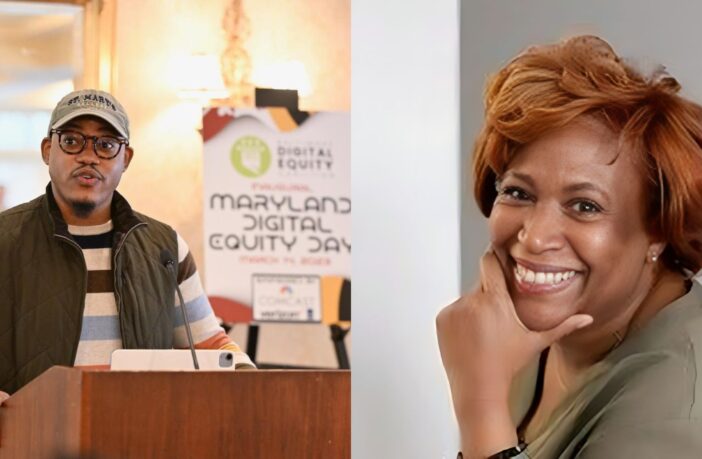By Megan Sayles
AFRO Business Writer
msayles@afro.com
The term “digital divide” rose to national prominence during the COVID-19 pandemic. As schools, businesses and workplaces went virtual, a spotlight was shone on the bleak reality of disparities in internet and technology access for underserved communities.
Cody Dorsey is the executive director of the Baltimore Digital Equity Coalition. Founded in 2020, the organization drives advocacy around the closing of the digital divide and expansion of digital equity.
Kenya Asli is the director of Baltimore’s Office of Broadband Digital Equity. The office is charged with leading the city’s five-year digital inclusion plan.
Courtesy photo
In Baltimore, the Abell Foundation discovered that 73.3 percent of White households had access to wired internet connection compared to 50.2 Black households respectively. Gaps were also uncovered in device access, as 60 percent of Black families had one laptop or desktop computer compared to 80.7 percent of White families.
“The digital divide is evidenced by the very high number of low-income communities who do not have wireline, in-home internet service,” said Kenya Asli, director for the Office of Broadband Digital Equity (BDE) for the city of Baltimore. “Wireless is great, 5G is good, but wireline is a reliable, consistent connection.”
“Even if you have wirelines, part of the digital divide is the affordability issue,” Asli continued. “You can have in-home internet connectivity, but it may cost you $200 a month.”
With technology tied to nearly every facet of daily life, the digital divide becomes a paralyzing obstacle in navigating the world today. Access to high-speed, reliable internet and devices underpins access to education, employment, healthcare, financial services, social programs and more.
The impact of the divide has led to calls to action for digital inclusion, or equity, which maintains that every person should have equal access to technology and digital resources.
“It’s a 21st century problem because digital equity is intertwined with every other issue. When you think of digital equity, you think about telehealth if you’re a healthcare provider,” said Cody Dorsey, executive director of the Baltimore Digital Equity Coalition. “If you’re an educator, you think about virtual learning. It also intersects with public safety.”
Dorsey’s organization was established in 2020 to promote advocacy for the closing of the digital divide and advancement of digital equity. While statistics surrounding connectivity in Baltimore put the gaps into numbers, Dorsey said it’s the lived experiences of residents that really illustrate how critical the problem is.
“We’ve heard stories of parents having to choose which child gets on Zoom for school,” said Dorsey. “We’ve heard stories of grandparents not getting visits from their grandchildren because they don’t have the internet.”
“When we think about digital equity, oftentimes, we talk about the internet connectivity piece, but there’s also the skills piece. With AI, we have to make sure people know what’s real and what’s fake,” Dorsey added. “We have to make sure people know how to work a device and are prepared for the workforce because 92 percent of jobs across the country require some level of digital skill.”
In December 2023, Baltimore Mayor Brandon Scott in conjunction with the Baltimore City Office of Information and Technology (BCIT) announced a five-year plan to decrease the digital divide, improve the city’s digital infrastructure and enable residents to equitably engage with technology.
The blueprint centers on four actionable goals: provide Baltimoreans with access to reliable, high-speed internet, enable them to obtain modern devices, offer digital skills training and supply technical support in multiple languages to all residents who need it.
BDE, an office under BCIT, has been tasked with implementing the plan. Asli said they’ve already begun to make progress.
Ensuring residents have access to reliable, high-speed broadband
Baltimore’s focus for internet connection rests in fiber optics.
“Fiber provides faster, more reliable speeds,” said Asli. “We want to make sure that Baltimore City has a future-facing network that will last a few generations.”
On the heels of the Digital Inclusion Strategy roll-out, Scott launched FreeBmoreWifi, a public-facing, free Wi-Fi network. It will be available in every city recreation center and several older adult centers.
“The plan is to get all 50 recreation centers done by August,” said Asli. “We already have 11 completed, and we wired up two pools just in time for Memorial day. In our recreation centers, we’re going to have indoor and outdoor, public Wi-Fi.”
The city is also addressing affordability with the Bmore Connected campaign. The initiative advocates for the reauthorization of the federal government’s Affordability Connectivity Program (ACP), which offered a monthly discounted internet service and a one-time subsidy for the purchase of a device. The program ended on June 1 due to a lack of funding from Congress.
To complement this effort, Baltimore is using $2 million in American Rescue Plan Act funds to deploy grants to local nonprofits and anchor institutions for the construction of broadband networks. The Connect Baltimore Broadband Grant Program is targeting internet service providers (ISPs) that will work in low-income communities—primarily multi-dwelling units— and provide internet service at low to no cost.
It’s part of Baltimore’s strategy to increase ISP competition in the city, which can create more affordable service options for residents. Later this year, Asli said a request for proposal (RFP) will be released to invite a new ISP to provide free internet service in eight of the Housing Authority of Baltimore City’s (HABC) public housing locations.
In the past, costs have been a barrier for attracting new ISPs. But, Baltimore is building out its middle mile infrastructure, which will enable ISPs to save money by leasing existing city lines to deliver internet service.
“What we hear time and time again from Baltimore City residents is we only have one provider in the city—good, bad or otherwise. They want to see more competition,” said Asli. “The belief is more competition will drive down those prices or at least offer a variety of price points.”
Getting devices in the hands of Baltimoreans
As part of a grant from the Maryland Connected Devices Program (MD-CDP), Baltimore has been in the process of distributing 50,000 Chromebooks to low-income households at no charge. BDE partnered with the Enoch Pratt Free Library to deploy the devices and expects to finish delivering them by December.
It also forged a partnership between Baltimore City Recreation and Parks and the library system to provide a number of Chromebooks to each of the city’s recreation centers.
Digital skills education and technical support
BDE has developed a directory of online training courses for residents that will be available on the devices at recreation centers. Asli acknowledged that this resource is limited to those who already know how to use technology.
“We know online training is great for those who know how to use devices. But, if you don’t then what?” said Asli.
To address this challenge, the second round of Baltimore’s Digital Equity Fund will award grants to nonprofits that can provide in-person training at recreation and community centers around the city. The first round of the fund delivered $1 million to more than 20 organizations for programs covering device access, digital literacy and science, technology, engineering and mathematics (STEM) education.
“We’re beginning to call rec centers, ‘tech hubs,’” said Asli. “Every rec center will have indoor and outdoor public Wi-Fi, devices you can borrow on site, a directory of training providers and, where possible, in-person training.”
This story is part of the Digital Equity Local Voices Fellowship lab. The lab initiative is made possible with support from Comcast NBC Universal.


